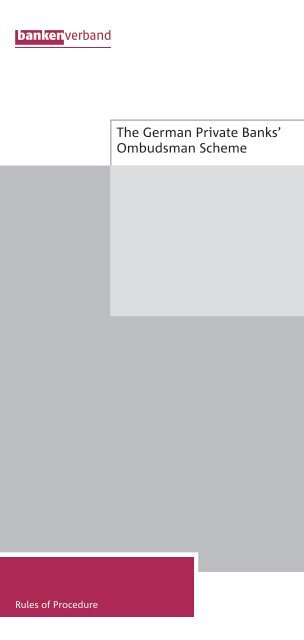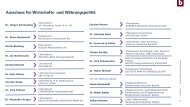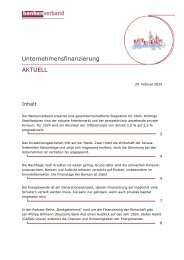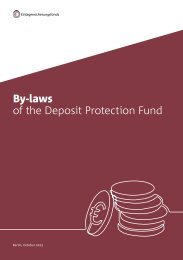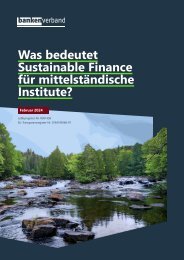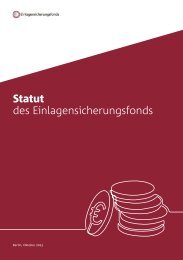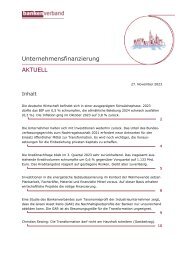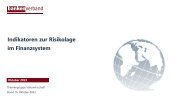The German Private Banks’ Ombudsman Scheme
The Association of German Banks (Bundesverband deutscher Banken) has established for its member banks an entity to resolve disputes between banks and consumers (Ombudsman Scheme).
The Association of German Banks (Bundesverband deutscher Banken) has established for its member banks an entity to resolve disputes between banks and consumers (Ombudsman Scheme).
- TAGS
- ombudsman
Create successful ePaper yourself
Turn your PDF publications into a flip-book with our unique Google optimized e-Paper software.
Rules of Procedure<br />
<strong>The</strong> <strong>German</strong> <strong>Private</strong> <strong>Banks’</strong><br />
<strong>Ombudsman</strong> <strong>Scheme</strong>
Rules of Procedure<br />
of the <strong>Ombudsman</strong> <strong>Scheme</strong><br />
of the <strong>German</strong> private banks 1<br />
Preamble<br />
<strong>The</strong> Association of <strong>German</strong> Banks (Bundesverband deutscher<br />
Banken) has established for its member banks an<br />
entity to resolve disputes between banks and consumers<br />
(<strong>Ombudsman</strong> <strong>Scheme</strong>).<br />
1 Translation of the original <strong>German</strong> text, which is binding in all respects.<br />
2
ankenverband<br />
Section 1 Organisation of the dispute resolution entity<br />
(1) <strong>The</strong> <strong>German</strong> private banks’ <strong>Ombudsman</strong> <strong>Scheme</strong> is<br />
a consumer dispute resolution entity approved by the<br />
Federal Office of Justice (Bundesamt für Justiz), comprising<br />
the ombudspersons appointed to resolve disputes and an<br />
office set up by the Association of <strong>German</strong> Banks to run the<br />
<strong>Ombudsman</strong> <strong>Scheme</strong> (<strong>Ombudsman</strong> <strong>Scheme</strong> Office).<br />
(2) Dispute resolution proceedings shall be conducted<br />
by an ombudsman/ombudswoman supported by the<br />
<strong>Ombudsman</strong> <strong>Scheme</strong> Office.<br />
Section 2 Appointment of the ombudspersons<br />
(1) Appointment and removal by the Board of Directors<br />
<strong>The</strong> ombudsman/ombudswoman shall be appointed<br />
by the Board of Directors of the Association of <strong>German</strong><br />
Banks at the recommendation of the Management Board<br />
for a term of three years. <strong>The</strong>y may be reappointed twice.<br />
Ombudspersons may only be removed by the Association’s<br />
Board of Directors before expiry of their term of office if facts<br />
are known indicating that fair, independent or impartial<br />
dispute resolution is no longer likely, if they are prevented<br />
not only temporarily from performing their duties, or for<br />
similar good cause. <strong>The</strong> ombudsman/ombudswoman shall<br />
notify the Association’s Board of Directors without undue<br />
delay of any grounds for their removal.<br />
(2) Participation of the Federal Office of Justice and consumer<br />
organisations<br />
Before appointing the ombudspersons, the Association of<br />
<strong>German</strong> Banks shall submit to the Federal Office of Justice<br />
and the Federation of <strong>German</strong> Consumer Organisations<br />
3
(Verbraucherzentrale Bundesverband [vzbv]) the name<br />
and professional curriculum vitae of the person proposed.<br />
If, within a period of two months, no facts are presented<br />
in writing which call into question the qualifications or<br />
impartiality of the person proposed or if any objections raised<br />
in this respect have been dealt with, the ombudsperson may<br />
be appointed pursuant to subsection 1, sentence 1.<br />
(3) Qualifications, independence and impartiality<br />
Ombudspersons must be qualified to hold judicial<br />
office. <strong>The</strong>y must not have been employed by either the<br />
Association of <strong>German</strong> Banks or a bank during the last three<br />
years prior to taking up office, unless they were employed<br />
by the Association solely as an ombudsperson. In their<br />
capacity as dispute resolvers, the ombudspersons shall be<br />
independent and not bound by any instructions. <strong>The</strong>y shall<br />
resolve disputes fairly and impartially.<br />
(4) Appointment of several persons, deputisation and case<br />
assignment plan<br />
Two or more persons shall be appointed ombudspersons.<br />
Another person shall be appointed for each as their deputy.<br />
<strong>The</strong> ombudspersons shall jointly determine the case<br />
assignment plan, including deputising arrangements, before<br />
each business year. <strong>The</strong> case assignment plan may only be<br />
altered during the business year for good cause.<br />
(5) Bias<br />
Ombudspersons shall not resolve a dispute if there<br />
are grounds that justify a lack of confidence in their<br />
independence or impartiality. Instead of the ombudsman/<br />
ombudswoman, their deputy shall resolve such disputes.<br />
4
ankenverband<br />
Section 3 Jurisdiction<br />
(1) <strong>The</strong> <strong>German</strong> private banks’ <strong>Ombudsman</strong> <strong>Scheme</strong> shall have<br />
jurisdiction for disputes between banks which are affiliated<br />
to the scheme (banks/bank) and consumers (applicants)<br />
concerning any of the products and services offered by banks,<br />
particularly disputes pursuant to Section 14 (1) of the <strong>German</strong><br />
Prohibitory Injunctions Act (Unterlassungsklagengesetz).<br />
(2) This jurisdiction shall not be confined to consumers if the<br />
dispute falls within the scope of the statutory provisions on<br />
payment services (Sections 675c to 676c of the <strong>German</strong> Civil<br />
Code [Bürgerliches Gesetzbuch]).<br />
Section 4 Grounds for refusal to deal with a dispute<br />
(1) <strong>The</strong> ombudsman/ombudswoman shall refuse to conduct<br />
dispute resolution proceedings if<br />
a) an inadequate application was made,<br />
b) the <strong>Ombudsman</strong> <strong>Scheme</strong> has no jurisdiction for the<br />
dispute and the application does not have to be handled<br />
in accordance with Section 5 (4), sentence 1 or 2,<br />
c) if the same dispute has already been dealt with or<br />
is currently being dealt with by a consumer dispute<br />
resolution entity,<br />
d) in the case of disputes concerning the right to open a basic<br />
payment account under the <strong>German</strong> Payment Accounts<br />
Act (Zahlungskontengesetz) administrative proceedings<br />
pursuant to Sections 48 to 50 of the <strong>German</strong> Payment<br />
Accounts Act to assert this right are pending or if such<br />
proceedings have produced an unchallengeable decision,<br />
e) in connection with the dispute an application for legal aid<br />
has been rejected because the intended litigation had little<br />
prospect of success or appeared frivolous,<br />
5
f) the dispute is already pending before a court of law,<br />
has been brought before a court of law in the past or<br />
is brought before a court of law by the applicant during<br />
the dispute resolution proceedings or a court of law has<br />
already issued a judgement on the dispute,<br />
g) the dispute has been resolved by way of an amicable<br />
agreement or in some other manner, or<br />
h) the claim involved in the dispute is already time-barred<br />
under the statute of limitations and the bank has pled the<br />
statute of limitations.<br />
If the ombudspersons find that there are grounds for refusing<br />
to conduct dispute resolution proceedings in accordance<br />
with sentence 1, the decision on such refusal shall be<br />
communicated without undue delay to the parties, indicating<br />
the grounds for the refusal.<br />
(2) <strong>The</strong> ombudspersons may refuse to conduct dispute<br />
resolution proceedings if<br />
a) a fundamental legal issue that plays a significant role in<br />
assessment of the dispute has not been settled or<br />
b) facts that have a crucial bearing on the content of a<br />
proposal for resolution of a dispute remain contentious<br />
during the dispute resolution proceedings because they<br />
cannot be clarified by the ombudspersons.<br />
<strong>The</strong> decision on refusal to conduct dispute resolution<br />
proceedings in accordance with sentence 1 shall be<br />
explained to the parties without undue delay.<br />
(3) A decision on refusal to conduct dispute resolution<br />
proceedings in accordance with subsection 1 or subsection<br />
2 shall only be possible up to three weeks after the point in<br />
6
ankenverband<br />
time at which the ombudsman/ombudswoman had all the<br />
information required for the proceedings at their disposal.<br />
Section 5 Preliminary examination procedure<br />
(1) Application for dispute resolution<br />
<strong>The</strong> application for dispute resolution should be made<br />
to the <strong>German</strong> private banks’ <strong>Ombudsman</strong> <strong>Scheme</strong> in<br />
text form (e.g. by letter, fax or email). It should contain a<br />
detailed account of the dispute that is to be resolved and<br />
indicate a specific claim. Copies of the documents needed<br />
to understand the dispute should be enclosed with the<br />
application. <strong>The</strong> applicant must affirm that<br />
a) the same dispute has neither already been dealt with<br />
nor is currently being dealt with by a consumer dispute<br />
resolution entity,<br />
b) in the case of disputes concerning the right to open a<br />
basic payment account neither administrative proceedings<br />
pursuant to Sections 48 to 50 of the <strong>German</strong> Payment<br />
Accounts Act are pending nor an unchallengeable decision<br />
on this right has been issued in such proceedings,<br />
c) the dispute has neither been judged by a court of law nor<br />
is pending before a court of law,<br />
d) the dispute has been resolved neither by way of an<br />
amicable agreement nor in any other manner and<br />
e) in connection with the dispute an application for legal aid<br />
has not been rejected because the intended litigation had<br />
little prospect of success or appeared frivolous.<br />
(2) Representation<br />
<strong>The</strong> parties shall be free to appoint representatives to act<br />
on their behalf in the dispute resolution proceedings. <strong>The</strong><br />
<strong>Ombudsman</strong> <strong>Scheme</strong> Office shall inform the parties at the<br />
7
start of the proceedings that they may at any stage in the<br />
proceedings seek advice from or representation by a lawyer<br />
or any other person authorised to provide legal services.<br />
Proof of such right of representation shall be required.<br />
(3) Formal preliminary examination<br />
<strong>The</strong> <strong>Ombudsman</strong> <strong>Scheme</strong> Office shall ascertain whether the<br />
bank is affiliated to the <strong>Ombudsman</strong> <strong>Scheme</strong>. If so, it shall<br />
confirm receipt of the application for dispute resolution<br />
to the applicant. It shall then examine the application and<br />
the documents submitted along with it. If the application<br />
fails to fulfil the requirements referred to in subsection 1,<br />
the <strong>Ombudsman</strong> <strong>Scheme</strong> Office shall draw the applicant’s<br />
attention to its inadequacies and request the applicant to<br />
remedy these within a period of one month. <strong>The</strong> applicant<br />
shall be informed that the ombudsman/ombudswoman<br />
will refuse to conduct dispute resolution proceedings if the<br />
inadequacies of the application are not remedied within<br />
this period.<br />
Once the application for dispute resolution has been<br />
rejected, the applicant cannot contact the <strong>German</strong> private<br />
banks’ <strong>Ombudsman</strong> <strong>Scheme</strong> again regarding the same<br />
dispute.<br />
(4) Referral and forwarding of an application for dispute<br />
resolution in the event of non-jurisdiction<br />
If the <strong>Ombudsman</strong> <strong>Scheme</strong> does not have jurisdiction for a<br />
dispute pursuant to Section 14 (1) of the <strong>German</strong> Prohibitory<br />
Injunctions Act, the <strong>Ombudsman</strong> <strong>Scheme</strong> Office shall refer<br />
the application for dispute resolution to the competent<br />
consumer dispute resolution entity, notifying the applicant<br />
at the same time.<br />
8
ankenverband<br />
If the opposing party does not have a branch in <strong>German</strong>y but<br />
one in another country that is a signatory to the Agreement<br />
on the European Economic Area, the <strong>Ombudsman</strong> <strong>Scheme</strong><br />
Office shall inform the applicant of the possibility to obtain<br />
out-of-court dispute resolution in this signatory country. At<br />
the applicant’s request, the <strong>Ombudsman</strong> <strong>Scheme</strong> Office shall<br />
forward the application to a competent out-of-court dispute<br />
resolution entity in the other signatory country.<br />
Section 6 Dispute resolution proceedings<br />
(1) Refusal to deal with a dispute<br />
If the <strong>Ombudsman</strong> <strong>Scheme</strong> Office comes to the conclusion<br />
that dispute resolution proceedings in accordance with<br />
Section 4 (1) a) to h) must be refused, it shall submit the<br />
case to the ombudsman/ombudswoman for a decision on<br />
refusal. If the ombudsman/ombudswoman does not find<br />
any grounds for refusal, the dispute resolution proceedings<br />
shall be continued.<br />
(2) Forwarding of an application for dispute resolution to the<br />
bank<br />
If the <strong>German</strong> private banks’ <strong>Ombudsman</strong> <strong>Scheme</strong> has<br />
jurisdiction for the application for dispute resolution and<br />
if such application fulfils the requirements of Section 5<br />
(1) of the present Rules of Procedure, the <strong>Ombudsman</strong><br />
<strong>Scheme</strong> Office shall forward the application to the bank,<br />
requesting it to comment within one month of receipt<br />
of the application. <strong>The</strong> <strong>Ombudsman</strong> <strong>Scheme</strong> Office shall<br />
forward the bank’s comments to the applicant. If, according<br />
to its comments, the bank is unwilling to satisfy the<br />
applicant’s claim, the <strong>Ombudsman</strong> <strong>Scheme</strong> Office shall<br />
advise the applicant to respond to the bank’s comments<br />
9
within one month. <strong>The</strong> periods referred to in sentence<br />
1 and sentence 3 may, on request, be extended by one<br />
month. On expiry of the deadline for a response by the<br />
applicant, the <strong>Ombudsman</strong> <strong>Scheme</strong> Office shall submit the<br />
case to the ombudsman/ombudswoman, unless the bank<br />
has satisfied the applicant’s claim or the dispute resolution<br />
proceedings have been concluded in some other manner.<br />
(3) Ombudsperson proceedings<br />
<strong>The</strong> ombudspersons may, in order to clarify the facts of the case<br />
and the issue in dispute, request additional comments from<br />
the parties or they may obtain information from the <strong>German</strong><br />
Federal Financial Supervisory Authority (Bundesanstalt für<br />
Finanzdienstleistungsaufsicht), the Deutsche Bundesbank or<br />
an entity within the European Economic Area responsible for<br />
out-of-court resolution of similar disputes. <strong>The</strong> ombudspersons<br />
shall only take evidence if such evidence can be furnished<br />
through the presentation of documents. If the ombudsman/<br />
ombudswoman does not require any further comments,<br />
documents or other information, the parties shall be informed<br />
without undue delay of the point in time at which all the<br />
information needed for dispute resolution was available.<br />
(4) Proposal for resolution of a dispute<br />
A proposal for resolution of a dispute within the meaning<br />
of the <strong>German</strong> Financial Dispute Resolution <strong>Scheme</strong>s<br />
Regulation (Finanzschlichtungsstellenverordnung) may be:<br />
a) a dispute resolution decision<br />
b) an amicable agreement.<br />
<strong>The</strong> ombudspersons shall communicate their proposal for<br />
resolution of a dispute to the parties in text form no later than<br />
90 days after the point in time at which all the information<br />
10
ankenverband<br />
required was available, unless this period was extended. <strong>The</strong>y<br />
may extend the period referred to in sentence 2, without the<br />
consent of the parties, for disputes that are highly complex or<br />
which raise difficult legal issues. <strong>The</strong> parties shall be informed<br />
without undue delay that the period has been extended. <strong>The</strong><br />
ombudspersons shall make proposals for resolution of disputes<br />
on the basis of the statutory provisions in force, paying due<br />
regard to the principles of fairness and justice. <strong>The</strong> proposal<br />
for resolution shall include a brief and easily understandable<br />
explanation. It may include a recommendation to cover outof-pocket<br />
expenses if this appears apt to resolve the dispute<br />
between the parties appropriately.<br />
(5) Binding force<br />
a) <strong>The</strong> dispute resolution decision shall be binding on the<br />
bank where the amount involved in the dispute does<br />
not exceed €10,000; in this case, the bank shall have no<br />
recourse to a court of law. If the amount involved in the<br />
dispute exceeds €10,000, but only part of this amount<br />
is claimed, the total amount shall apply. <strong>The</strong> dispute<br />
resolution decision shall not be binding on the applicant.<br />
<strong>The</strong>y can accept the decision within six weeks of its receipt<br />
by notifying the <strong>Ombudsman</strong> <strong>Scheme</strong> Office in text form.<br />
If they do not accept the decision, they shall be free to<br />
seek redress through court proceedings.<br />
b) Dispute resolution decisions in proceedings involving<br />
an amount over €10,000 and proposals for an amicable<br />
agreement shall not be binding on either party. Such<br />
dispute resolution decisions and proposals for an amicable<br />
agreement may be accepted within six weeks of their<br />
receipt by notification to the <strong>Ombudsman</strong> <strong>Scheme</strong> Office<br />
in text form.<br />
11
c) <strong>The</strong> parties shall be advised thereof and of the fact that<br />
they are not obligated to accept such dispute resolution<br />
decisions and proposals and that, if they do not, they<br />
are entitled to seek redress through court proceedings.<br />
<strong>The</strong>y shall also be advised of the legal consequences of<br />
accepting a dispute resolution decision or a proposal<br />
for an amicable agreement and that a court may<br />
decide differently. On expiry of the relevant period, the<br />
<strong>Ombudsman</strong> <strong>Scheme</strong> Office shall inform the parties of<br />
the outcome of the dispute resolution proceedings in<br />
text form, indicating the parties and the subject of the<br />
dispute. <strong>The</strong> outcome of the resolution proceedings shall<br />
be explained in such notification, which shall effectively<br />
terminate the proceedings.<br />
d) No legal remedy against proposals for resolution of<br />
disputes made by the ombudspersons shall be provided<br />
for under the present Rules of Procedure.<br />
(6) Confirmation of failure to reach an out-of-court agreement<br />
on request<br />
If the applicant wishes to seek redress through court<br />
proceedings and if, in order to do so, they require written<br />
confirmation of an unsuccessful attempt to reach an<br />
agreement before an out-of-court dispute resolution entity,<br />
this shall be furnished to them. If the dispute was not settled<br />
in dispute resolution proceedings, notification thereof shall<br />
be deemed to be written confirmation of an unsuccessful<br />
attempt to reach an agreement pursuant to Section 15a (1),<br />
sentence 2 of the Introductory Act to the <strong>German</strong> Code of<br />
Civil Procedure (Einführungsgesetz zur Zivilprozeßordnung<br />
[EGZPO]).<br />
12
ankenverband<br />
(7) Withdrawal of an application for dispute resolution<br />
<strong>The</strong> applicant may withdraw an application for dispute<br />
resolution at any time up to conclusion of the proceedings.<br />
Withdrawal of the application for dispute resolution means<br />
that the proceedings shall be terminated prematurely. If a<br />
renewed application for resolution of the same dispute is<br />
made to the <strong>German</strong> private banks’ <strong>Ombudsman</strong> <strong>Scheme</strong>,<br />
dispute resolution proceedings shall be refused pursuant<br />
to Section 4 (1) c).<br />
Section 7 Suspension of limitation<br />
Suspension of limitation shall be governed by Section 204<br />
of the <strong>German</strong> Civil Code.<br />
Section 8 Language of the proceedings<br />
Dispute resolution proceedings shall be conducted in<br />
<strong>German</strong>.<br />
Section 9 Confidentiality of the proceedings<br />
<strong>The</strong> ombudspersons and the persons employed at the<br />
<strong>Ombudsman</strong> <strong>Scheme</strong> Office shall be obligated to treat<br />
dispute resolution proceedings as strictly confidential.<br />
13
Section 10 Cost of the proceedings<br />
(1) <strong>The</strong> cost of dispute resolution proceedings shall be<br />
borne by the Association of <strong>German</strong> Banks.<br />
(2) Out-of-pocket expenses incurred by the parties, such<br />
as postage and telephone costs, shall not be reimbursed.<br />
If the bank has agreed a foreign contract language with<br />
the applicant and/or if foreign law is applicable, it shall<br />
reimburse to the Association the expenses incurred by the<br />
Association in obtaining translations and necessary legal<br />
opinions on the foreign jurisdiction. Before obtaining a<br />
translation or a legal opinion, the Association shall give the<br />
bank the opportunity to comment.<br />
(3) Where either of the parties arranges for a representative<br />
to act on their behalf, they shall bear the cost of such<br />
representation themselves.<br />
Section 11 Entry into force/final provision<br />
(1) <strong>The</strong> present Rules of Procedure shall apply to<br />
applications for dispute resolution that are received as of<br />
1 February 2017.<br />
(2) <strong>The</strong> restriction on reappointment pursuant to Section 2<br />
(1), sentence 2 shall not apply to the ombudspersons already<br />
in office on 1 February 2017.<br />
14
ankenverband<br />
Publishing details | Publisher: Bundesverband deutscher Banken e. V.,<br />
Postfach 040307, 10062 Berlin | Legally responsible: Oliver Santen<br />
Printing: PieReg Druckcenter Berlin |Design: doppel:punkt redaktionsbüro<br />
janet eicher, Bonn | As at: January 2018<br />
15
y post:<br />
Bundesverband deutscher Banken<br />
<strong>Ombudsman</strong>n der privaten Banken<br />
Geschäftsstelle<br />
Postfach 040307 | 10062 Berlin<br />
by phone:<br />
+49 30 1663-3166<br />
by email:<br />
ombudsmann@bdb.de<br />
online:<br />
en.bankenverband.de/ombudsman-scheme


